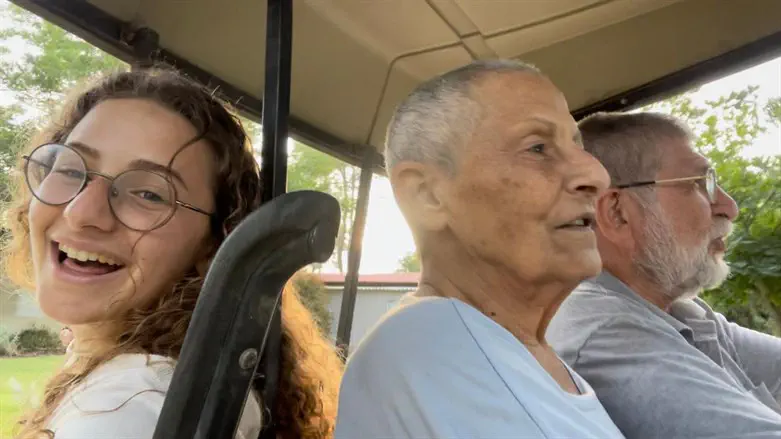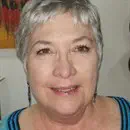
"So far so good" - this was the last message Ofir Metzger got at 8:50 on Saturday morning, 7 October 2023 from her grandfather who was abducted by Hamas. Other than knowing that Yoram and Tamar Metzger arrived alive in Gaza, the family has received no news about them.
Yoram Metzger, 80, and his wife Tamar, 78, went into their home shelter on Kibbutz Nir Oz when southern Israel was woken up by sirens at 6:30 a.m. The kibbutz is only three kilometers from the border fence with Gaza. I spoke with their eldest granddaughter, Ofir Metzger (22).
“By 8:50,” Ofir said, ”my grandfather sent me the last message. I had sent him several messages, but he’s a grandfather, you know, and the technology, he doesn’t always answer messages. Then he wrote that everything’s okay and he even wrote a joke: ‘Like the man who fell from the Empire State Building said: so far so good.’ I sent him another message after 9 and didn’t get a response. For three days, Ofir continued sending unanswered messages to her grandfather’s phone.”
A week later, the family was told that phone tracking proved that Yoram and Tamar were in Gaza. And when Yocheved Lifshitz and Nurit Yitzhak, also members of Nir Oz, were released from Hamas captivity on 26 October, Yocheved let Ofir’s family know that she had seen Yoram and Tamar arrive alive in Gaza.
Ofir’s Grandparents
Tamar Metzger was born in Tel Aviv into a family originally from Yemen. Yoram was born in Petach Tikva. His parent were the sole survivors of his family, the rest having been murdered in the Holocaust.
The couple met in Kibbutz Amiad where both were doing their army service. This was a case of opposites attract: “My grandmother is quiet and introverted, super intelligent,” Ofir began, “and my grandfather is very sociable, an extrovert, and he likes to tell jokes. She was the most beautiful woman then and she still is, even in old age. They raised three sons and worked over the years in various jobs in the kibbutz, wherever they were needed.”
Ofir smiled widely and her eyes sparkled as she spoke about her grandparents, called Saba (grandfather) and Safta (grandmother) in Hebrew.
“Until I was 4 years old, my family also lived on Kibbutz Nir Oz. I was with my grandparents every day. Saba would make open-face sandwiches with cheese on top of which he would make a mouth out of tomato and eyes from olives. I still love it when he makes those sandwiches.
After that, we would visit for family meals. Then, once I could drive, I would visit them often. I liked having them to myself. We would tell stories, and we’d argue about politics – Saba loves that. We could have the same opinion but he knew how to find the smallest detail to debate about.”
I asked what characteristics each has that would help them endure their captivity with Hamas. Ofir said, “Both are very strong. Saba knows some Arabic and he knows how to talk with everyone. So if it is at all possible, I know he will make himself indispensable in some way. Safta is very strong inside. She is calm and collected.
Of course, I am very worried about them. Yocheved came back very thin – looking like she lost 20 KG. Safta is already thin, a small woman and elderly, with not a gram to spare. She smokes a lot. I am worried about her health. She has kidney issues. Saba has diabetes. As more time passes, I am more worried about their health and that is in addition to worrying about what they may have to endure at the hands of their captors.”
At this point of our interview, my phone vibrated loudly on the table beside me, a sign that a siren was going off somewhere in the country. At the same time, Ofir pointed out that there was a loud boom nearby – likely the explosion in the air when our defensive weapons knocked out a missile on its way from Gaza. Close enough to hear, but not on its way to where she was sitting.
How are you and your family coping?
“It is very difficult at home – my parents know the kibbutz community very well and it is not just worrying about my grandparents that is hard – the kibbutz lost ¼ of its community in a single day. One-quarter of the kibbutz was either murdered or abducted. They are trying to collect the pieces. There is a funeral every day. They don’t sleep at night. I sleep more than them but when I wake up I am even more tired. Sleep is an escape for me.
This week, my father and some of the others who had grown up in the kibbutz went back to help clean up. Everything stopped that Saturday morning. Fridges are still full; there are ovens with meals still in them. The army did what it could; Zaka [the volunteer organization that identifies the dead, sometimes having to piece together shattered body parts] cleared away the bodies. But it doesn’t end there. There is still so much to do.
For me, I look at the videos of what happened that day and these are people I know, that I grew up knowing. It is not a movie. These people were just regular people on a regular Saturday morning, and suddenly it stopped. You see that in the photos – jachnun [a traditional Jewish Yeminite pastry] in the oven. In the middle of normal life, everything suddenly ceased.
Has this experience changed you?
“Before this, I wanted to believe it’s not everyone who is against us, just the terrorist organization, but I discovered that it’s not just that. It is hatred toward Israel. And those who are so-called pro-Palestinian Arabs [does scare quotes in the air] it’s not that – it’s hatred toward Israel. There is no help here for the Palestinian Arabs.
I see a lot of pro-Palestinian Arab material on the Internet, some of it very difficult to watch, supporting the atrocities and I want to know how they think that the atrocities will free "Palestine". Really! How?
Gazan children, and not just children, were treated in Israeli hospitals for years. Before they built the fence and before the disengagement, Gaza and Nir Oz lived as neighbors. If they needed an ambulance in Gaza, the kibbutz sent theirs. These are people who Nurit and Yocheved assisted for years. How the hell are they the first victims and the whole world justifies it? Where did the world’s moral compass go?
How does talking about “freedom” [here Ofir waves her hands in the air and looks upward with cynicism in her eyes] justify this? Why do they think that the freedom they want for the people is something Hamas would give them?
How do people who Hamas would kill in an instant justify that regime?
Secondly, my trust in the state was broken. I just finished serving in the IDF and I say – I gave my life to protect the country and did the most and the best that I could. Then I don’t get help back as a civilian? Why did it enter my house?
I want my grandparents to come back home, and I now understand how this situation is not just between us and Hamas – it is the whole world. The whole world is pressuring us.”
